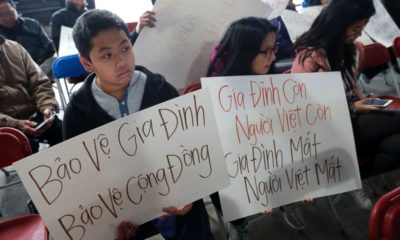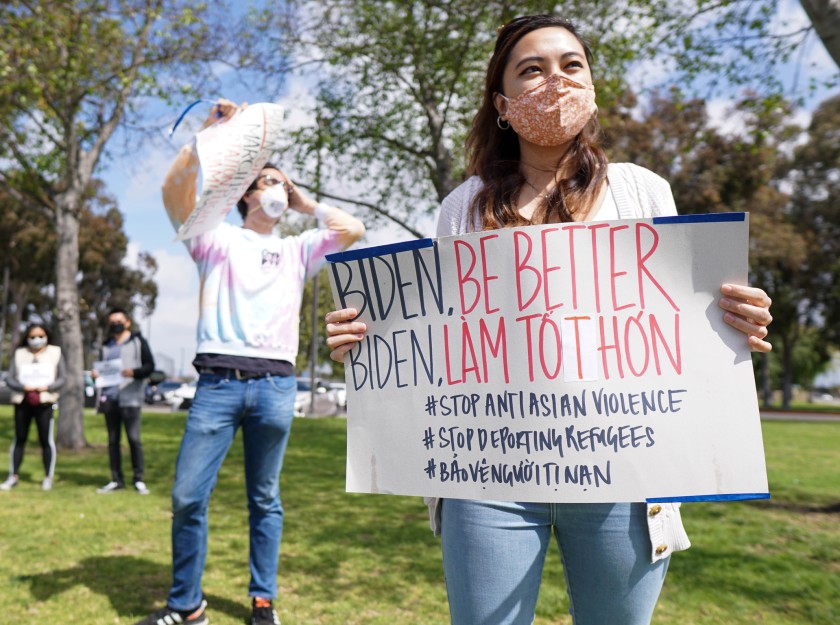(A protest is held in Orange County’s Little Saigon on March 14. Source: Los Angles Times)
Anna Nguyen
Biden and the Refugee Deportation Pipeline
The Trump administration’s attempt to amend the 2008 MOU was a particularly egregious decision that reflects the inconsistencies between America’s inclusive exterior and nativist interior. The issue of Vietnamese refugee repatriation extends beyond this specific administration, however. Shortly after he took office, President Biden announced that he would be maintaining the historically low number of refugee admissions set by Trump. This move sparked outrage from legislators and immigration advocates alike, who condemned his choice to keep the cap at 15,000 refugees as opposed to the 60,000 he promised during the campaign.[1] Although Biden eventually issued a statement indicating his intention to revise the refugee admissions limit to 65,000, his apprehension about even reaching that number during the first fiscal year of his presidency still remains.[2]
Throughout his presidential campaign, Biden framed himself as the political antithesis to Trump and committed to undoing the punitive immigration policies his predecessor instituted. He did so on his first day in office and reversed Trump’s policies regarding defunding sanctuary cities, construction of the border wall, and the notorious travel ban applicable to primarily Muslim countries .[3] At the same time, however, the Biden administration has continued to use a controversial Trump-era rule that expelled a majority of migrants and asylum seekers apprehended at the Southern border.[4] In conjunction with the initial continuation of Trump’s refugee admissions cap, it looks like Biden has taken the harsh immigration policies he inherited from Bush, Obama, and Trump and given them a life of their own.
For Vietnamese refugees, the brief glimmer of hope that came with a Democratic presidential victory last November quickly soured. 33 Vietnamese refugees were among a number of Southeast Asians deported from the United States on March 15, 2021. Advocacy groups in Southern California mobilized in response to this repatriation, claiming that forced removals of refugees from their families in the midst of a global pandemic were gratuitously cruel.[5] Some groups characterized this repatriation as a form of violence inflicted against Asian Americans and the immigrant communities they were a part of. These actions ultimately trace back to Biden himself, who tentatively posed a 100-day moratorium on deportations before a federal judge struck the ban down.[6]
Biden’s history as a legislator in Congress informs his duties and priorities as president in a variety of ways. As the chair of the Senate Judiciary Committee, then-Senator Biden sponsored the infamous 1994 Crime Bill that was known for its tough-on-crime approach, harsh sentencing laws, and institution of mandatory minimums.[7] The legacy of this bill is immense. Not only did the Crime Bill represent a political shift towards more punitive modes of arrest and detention, it also contributed to the mass incarceration of Black and brown men. Southeast Asians in particular were swept up in this incarceration expansion as well, but more so through the immigration-prison-deportation pipeline.
The pipeline describes a continuum of political and economic precarity that subjects immigrants to incarceration and deportation after they arrived in the United States. Although the Crime Bill was written with the intention of reducing crime on a national scale, it ended up marginalizing already impoverished communities by needlessly incarcerating their youths. Young Vietnamese refugees involved with gangs and other aspects of street culture I described in Part 1 were targeted and steered into this continuum. Most of the crimes committed by immigrants during the late 1990s were nonviolent, and many ex-convicts rebuilt their lives by starting families after their reentry into society. The Trump administration’s attempt to rework the 2008 MOU and Biden’s repatriation of Vietnamese refugees illustrates the consistency in US deportation policy across party lines.
The Consequences of Repatriation
South Vietnamese refugees who left their country after the war did so in haste and desperation. Because of their allegiance to South Vietnam, former refugees who are deported to their home country would likely face serious repercussions. I received information about one such case, regarding an older Vietnamese man who fought in the war on the side of the U.S.-backed South Vietnamese state. This individual ultimately left Vietnam with his brother after the war and resettled in the United States. He was convicted of a crime in 2012 and sentenced to several years of imprisonment. Even though questions have been raised about his conviction, ICE still detained him at the conclusion of his sentence and placed him in removal proceedings for departure to Vietnam. Now in his old age, this Vietnamese elder feared that his forced return to Vietnam would result in his arrest and torture by agencies seeking information about his involvement in the war.
Tuong Vu, a University of Oregon political scientist, offered his expertise in support of this case. Vu testified with certainty to the possible detention and punishment of this individual if he were repatriated to Vietnam. Even though the Vietnamese government remains selective in choosing who to take back from the United States, information about each potential deportee would likely be scrutinized to a significant degree. This case resulted in a positive outcome as a judge granted this gentleman his wish not to be deported.
Another relevant example of Vietnamese repatriation is the case of Tien Pham, who was deported along with 32 others on the March 15 flight mentioned earlier. Pham was born in 1983 to parents who migrated to South Vietnam from the North in 1955. His father’s involvement in the South Vietnamese military led to his imprisonment in a re-education camp before his release and eventual resettlement in America. Pham’s family soon relocated to San Jose, California, where the young boy faced academic and social difficulties at school. Growing up as a teenager in the late 1990s produced unique challenges for Pham, and his experiences are reminiscent of those in the immigration-prison-deportation-pipeline. 17-year-old Pham was prosecuted as an adult after getting into a fight and ultimately received a harsh 28-year sentence for attempted murder. Pham’s surprise deportation came after being granted parole last June, at a time where COVID-19 outbreaks were on the rise among the inmate population. Valiant efforts from local advocacy groups were also unsuccessful in halting his repatriation, despite their attempts to spread his story through a widespread public campaign. Regardless of these circumstances however, Pham should have returned to his family after completing his sentence but was never given the opportunity due to his apprehension by ICE.[8]
Repatriation of these Vietnamese-Americans deftly illustrates the degree of cruelty former refugees are subject to as they are deported back to the country of their origin. Pham Chi Cuong is one of many men who were deported back to Vietnam as a result of the 2017 memorandum reinterpretation. His mixed Amerasian identity subjected him to a multitude of postwar challenges in Vietnam before he relocated to the United States in 1990. Even though Mr. Pham was convicted of assault and battery in 2000 and was assigned a one-year probation for driving under the influence a few years later, he was not deported at that time because Vietnam had not yet agreed to accept deportees back. ICE took him into custody in 2017, however, and sent him on a plane back to Vietnam soon after. In his interview, Mr. Pham said that adjusting to life in the country that he had fled almost three decades earlier was difficult. Deportees like him struggled to find stable work and received very little assistance from the Vietnamese government.[9]
Immigrant detention and removal practices continue to be notoriously controversial in America. Undocumented residents convicted of minor felonies should not be subjected to removal, but many still are to this day. The process of extracting and deporting noncitizens from the United States is an experience mired in apprehension and uncertainty. Quyen Dinh, Executive Director of SEARAC, attests to this removal process as a dehumanizing one. I spoke to Ms. Dinh prior to the refugee deportations last March and gathered her insights on the deportation work conducted by ICE and the responses initiated against it by SEARAC. A significant amount of the refugees Ms. Dinh works with at SEARAC commit “crimes of poverty or crimes of youth…. Many ended up making mistakes that they have since transformed from, so the majority of individuals we work with have also their conviction records that are decades old.” Noncitizens are forced to live in limbo as they attempt to navigate through a world where they are rendered practically invisible in the eyes of the state.
Towards the end of our conversation, Ms. Dinh spoke to me about the policy changes she hopes to see with a new presidential administration in office. Under her leadership, SEARAC has piloted a number of political education campaigns to raise awareness about prosecutorial discretion ICE officers can use to keep refugee families united together. These campaigns “had some traction [and Ms. Dinh hopes] that a lot of that education will now be continued through the Biden administration, especially with Alejandro Mayorkas as the new Secretary of Department of Homeland Security.”
Conclusion
The twenty-first century has seen four different men elected to the United States presidency, each with a different agenda in mind. As administrations transitioned and party politics shifted over the years, however, one thing has remained remarkably consistent: punitive deportation policies targeted at certain vulnerable minority communities. The younger Bush nudged this cycle into gear with his support for the legal process for immigration like DACA at the expense of returnees who were removed from the United States without any record. In a similar fashion, Obama continued to support DACA but made a more concerted effort to deport immigrants with criminal convictions. Alternatively, Trump’s condemnation of DACA during his campaign paved the way for more of his egregious actions while in office. Bush concluded the 2008 MOU that opened the way for the US to repatriate Vietnamese nationals in the deportation pipeline. Trump sought to reinterpret it to make no exemption for former refugees. The legacies that Bush, Obama, and Trump left in their wake are rife with contradictions but become unified in their harsh attempts to remove or reject immigrants who have violated American law, including former Vietnamese refugees.
Reversals of removal proceedings – especially with a criminal conviction on record – are rare. The hope of such an outcome puts many former refugees in a position of fear as they evaluate the precarity of their citizenship status. Vietnamese refugees who were detained following the 2017 memorandum reinterpretation were often there for petty crimes or misdemeanors committed during their youth. Many have now been detained for years as they wait for their cases to be processed. With important issues like the COVID-19 pandemic, climate change, and economic recovery all on deck, the Biden administration has a lot ahead of them to tackle over the next four years. Comprehensive and compassionate immigration policies should be on that priority list as well, in order to undo the harm caused by previous administrations and pave the way for more inclusive approaches to entry and citizenship.
References
Biden, Joseph. “Executive Order on the Revision of Civil Immigration Enforcement Policies and Priorities.” The White House: Presidential Actions, January 20, 2021. Accessed June 12, 2021.
Biden, Joseph. “Proclamation on Ending Discriminatory Bans on Entry to The United States.” The White House: Presidential Actions, January 20, 2021. Accessed June 12, 2021.
Biden, Joseph. “Proclamation on the Termination Of Emergency With Respect To The Southern Border Of The United States And Redirection Of Funds Diverted To Border Wall Construction.” The White House: Presidential Actions, January 20, 2021. Accessed June 12, 2021.
Biden, Joseph. “Statement by President Joe Biden on Refugee Admissions.” The White House, May 03, 2021. Accessed June 10, 2021.
Congress.gov. “Text – S.1241 – 102nd Congress (1991-1992): Biden-Thurmond Violent Crime Control Act of 1991.” November 21, 1991. https://www.congress.gov/bill/102nd-congress/senate-bill/1241/text.
Joffe-Block, Jude. “Under Biden, US still expels many migrants at border.” AP News, March 15, 2021. https://apnews.com/article/fact-checking-afs:Content:9961724275.
Kanno-Youngs, Zolan and Miriam Jordan. “Biden Wavers on Restricting Refugee Entry.” New York Times, April 26, 2021. https://www.nytimes.com/2021/04/16/us/politics/joe-biden-refugee-policy.html.
Levin, Sam. “Deported by Biden: a Vietnamese refugee separated from his family after decades in US.” The Guardian, May 03, 2021. https://www.theguardian.com/us-news/2021/may/03/biden-deportations-vietnamese-refugee-california-ice.
Merchant, Nomaan. “Judge bars Biden from enforcing 100-day deportation ban.” AP News, January 26, 2021. https://apnews.com/article/joe-biden-immigration-texas-barack-obama-51688033e490d50867e52ef9c8ec574f.
“Mỹ trục xuất 33 người gốc Việt, các nhóm vận động ‘thất vọng’ và ‘tức giận’.” VOA Tiếng Việt, March 17, 2021. https://www.voatiengviet.com/a/m%E1%BB%B9-tr%E1%BB%A5c-xu%E1%BA%A5t-33-ng%C6%B0%E1%BB%9Di-g%E1%BB%91c-vi%E1%BB%87t-c%C3%A1c-nh%C3%B3m-v%E1%BA%ADn-%C4%91%E1%BB%99ng-th%E1%BA%A5t-v%E1%BB%8Dng-v%C3%A0-t%E1%BB%A9c-gi%E1%BA%ADn-/5818000.html.
Pearson, James. “’No job, no money’: Life in Vietnam for immigrants deported by U.S.” Reuters, April 19, 2018. https://www.reuters.com/article/us-usa-vietnam-deportees/no-job-no-money-life-in-vietnam-for-immigrants-deported-by-u-s-idUSKBN1HR08E.
Notes
[1] Zolan Kanno-Youngs and Miriam Jordan, “Biden Wavers on Restricting Refugee Entry,” New York Times, April 26, 2021, https://www.nytimes.com/2021/04/16/us/politics/joe-biden-refugee-policy.html.
[2] Joseph Biden, “Statement by President Joe Biden on Refugee Admissions,” The White House, May 03, 2021, Accessed June 10, 2021.
[3] Joseph Biden, “Executive Order on the Revision of Civil Immigration Enforcement Policies and Priorities,” The White House: Presidential Actions, January 20, 2021; Joseph Biden, “Proclamation on the Termination Of Emergency With Respect To The Southern Border Of The United States And Redirection Of Funds Diverted To Border Wall Construction,” The White House: Presidential Actions, January 20, 2021; Joseph Biden, “Proclamation on Ending Discriminatory Bans on Entry to The United States,” The White House: Presidential Actions, January 20, 2021, All accessed June 12, 2021.
[4] Jude Joffe-Block, “Under Biden, US still expels many migrants at border,” AP News, March 15, 2021, https://apnews.com/article/fact-checking-afs:Content:9961724275.
[5] “Mỹ trục xuất 33 người gốc Việt, các nhóm vận động ‘thất vọng’ và ‘tức giận’,” VOA Tiếng Việt, March 17, 2021.
[6] Nomaan Merchant, “Judge bars Biden from enforcing 100-day deportation ban,” AP News, January 26, 2021, https://apnews.com/article/joe-biden-immigration-texas-barack-obama-51688033e490d50867e52ef9c8ec574f.
[7] Congress.gov, “Text – S.1241 – 102nd Congress (1991-1992): Biden-Thurmond Violent Crime Control Act of 1991.” November 21, 1991, https://www.congress.gov/bill/102nd-congress/senate-bill/1241/text.
[8] Sam Levin, “Deported by Biden: A Vietnamese refugee separated from his family after decades in US,” The Guardian, May 03, 2021, https://www.theguardian.com/us-news/2021/may/03/biden-deportations-vietnamese-refugee-california-ice.
[9] James Pearson, “’No job, no money’: Life in Vietnam for immigrants deported by U.S.” Reuters, April 19, 2018, https://www.reuters.com/article/us-usa-vietnam-deportees/no-job-no-money-life-in-vietnam-for-immigrants-deported-by-u-s-idUSKBN1HR08E.

 Politics & Economy4 years ago
Politics & Economy4 years ago
 Politics & Economy2 years ago
Politics & Economy2 years ago
 After 19751 year ago
After 19751 year ago
 ARCHIVES5 years ago
ARCHIVES5 years ago
 Society & Culture5 years ago
Society & Culture5 years ago
 Politics & Economy4 years ago
Politics & Economy4 years ago
 Politics & Economy5 years ago
Politics & Economy5 years ago
 Vietnamese-America4 years ago
Vietnamese-America4 years ago







